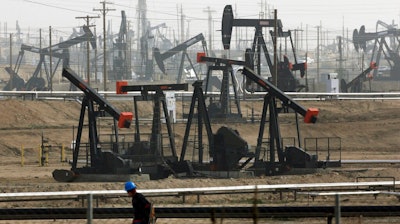
SACRAMENTO, Calif. (AP) — New legislation would ban all fracking in California by 2027, taking aim at the powerful oil and gas industry in the state already planning to ban the sale of new gas-powered cars by 2035. Progressive California has long been a leader in combating climate change, requiring solar panels on new homes and passing a law to make the nation's most populated state rely entirely on renewable energy by 2045.
But environmental groups say California officials — particularly governors — have long had a blind spot for the oil and gas industry, which has wielded its immense political power many times to kill or weaken legislation aimed at curtailing production.
That could be changing. Last year, Democratic Gov. Gavin Newsom announced steps to ban the sale of new gas-powered cars and called on lawmakers to go further by banning new permits for fracking, a technique to extract oil and gas embedded in rock deep beneath the surface that climate groups say harms the environment and threatens public health.
Two state senators answered that call Wednesday, announcing a measure that would halt new fracking permits or renewals by January 1 and ban the practice altogether by 2027. Democratic state Sens. Scott Wiener of San Francisco and Monique Limon of Santa Barbara also say they will change the bill next month to halt new oil and gas permits within 2,500 feet (762 meters) of homes or schools by Jan. 1.
"This is real. It is harming so many people, and the time to deal with it in the future is over. We need to deal with it now," Wiener said.
The oil and gas industry quickly pushed back. Catherine Reheis-Boyd, president and CEO of the Western States Petroleum Association, said the legislation was "so broad and ambiguous" it would "lead to a total (oil) production ban in California." Rock Zierman, CEO of the California Independent Petroleum Association, called the measure "legally questionable."
"Shutting down energy production under the toughest regulations on the planet will devastate the economies of oil-producing regions," Zierman said. Newsom, speaking at an unrelated news conference in the Coachella Valley, said he had not read the proposal yet and was "unable to comment on it."
California was among the top oil-producing states in the country, reaching a peak of 394 million barrels in 1985. But by 2017, production had dropped significantly, and it now ranks behind Texas, North Dakota, New Mexico, Oklahoma, Colorado and Alaska, according to the U.S. Energy Information Administration.
Part of the reason is the industry has exhausted much of California's easily extractable oil reserves. What's left is embedded deep in rock underground that requires immense energy to extract. That includes using processes like fracking, cyclic steaming, acid well stimulation and water and steam flooding to separate the oil from the rock — all processes that would be banned by 2027 under the new legislation.
"It's some of the dirtiest oil in the world," said Hollin Kretzmann, an attorney at the Center for Biological Diversity's Climate Law Institute.
Environmental groups say those methods can cause significant harm to air quality and water supplies. Research published this month by a team at Harvard University estimated that 8.7 million people worldwide died prematurely from fossil fuel pollution in 2018, including 34,000 people in California, the Desert Sun in Palm Springs reported.
"We must stop doing what we know causes death and disease," said Dr. Karina Maher, a pediatrician in Los Angeles who works with the advocacy group Climate Health Now.
But critics say halting the state's oil production won't stop the state's reliance on oil because millions of people still drive gas-powered cars. State Sen. Shannon Grove, a Republican whose district includes parts of Kern County, said that if the bill becomes law, it would force the state to "rely on foreign countries with dismal human rights records that barely let women drive and have little to no regard for the environment."
Republican Assemblyman Vince Fong, who also represents Kern County, said California produces oil "in the most environmentally responsible way."
"At a time like now, when we need to be revitalizing our economy, I don't quite understand why we would be pushing legislation that eliminates jobs in our state," he said.
California has more than 5,500 oil wells that have likely been abandoned and could cost more than half a billion dollars to clean up, according to an assessment by the California Council on Science and Technology. For companies that eventually do that work, the legislation would require the state to offer them undefined "incentives" to hire laid-off oil and gas workers.
Wiener says it makes sense to start preparing for the eventual decline of the oil and gas industry and try to avoid the fate of the coal industry, whose decline has devastated communities in the Appalachian region. "It's a declining industry. And instead of waiting for it to eventually decline and fall apart, let's get ahead of it, facilitate the phasing out and help the workers," Wiener said.






















